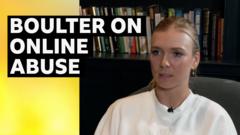What Did Boulter Reveal About the 'Disgusting' Online Abuse She Faced?

## Understanding Online Abuse in Sports: The Case of Katie Boulter
In recent years, the issue of online abuse has surged, particularly in the world of sports. Athletes, including British number two Katie Boulter, have increasingly become targets of vitriolic messages on social media platforms. This phenomenon raises significant concerns about mental health, the impact of gambling on sports, and the responsibilities of social media companies to protect their users.
### The Rise of Online Abuse in Sports
Online abuse towards athletes is not a new issue, but it has become alarmingly prevalent with the rise of social media. Platforms like Twitter, Instagram, and Facebook allow fans to express their opinions, but they also provide a breeding ground for toxic behavior.
#### Key Statistics on Online Abuse
- **Increased Incidence**: Studies show that approximately 40% of athletes have experienced some form of online harassment.
- **Targeting Female Athletes**: Female athletes, like Katie Boulter, face a disproportionate amount of abuse, often related to their performance in matches.
- **Gambling Influence**: Many cases of online harassment are linked to betting, where disgruntled gamblers lash out when their expectations are not met.
### Katie Boulter's Experience with Online Abuse
Katie Boulter, a rising star in British tennis, recently opened up about the abuse she has received on social media. The messages she shared highlight a dark side of the sporting world that is often overlooked.
#### Nature of the Abuse
1. **Harsh Criticism**: Many messages include severe criticism of her performance, often following losses in matches.
2. **Personal Attacks**: Some individuals resort to personal attacks, questioning her talent and dedication.
3. **Threatening Messages**: In extreme cases, threats of violence or harsh repercussions for poor performance are sent, creating a climate of fear.
#### Impact on Mental Health
The psychological toll of such abuse can be debilitating. Athletes like Boulter report feelings of anxiety, depression, and isolation resulting from online harassment.
- **Mental Health Statistics**: Research indicates that up to 30% of athletes experience significant mental health issues due to external pressures, including online abuse.
- **Coping Mechanisms**: Many athletes are now seeking therapy and support networks to help them deal with the emotional impact of abuse.
### The Role of Gambling in Online Abuse
A significant factor contributing to the rise in online abuse is the influence of gambling on sports. As betting becomes more accessible, the pressure on athletes increases, leading to heightened emotions among fans.
#### The Betting Culture
- **Widespread Gambling**: With the proliferation of online betting platforms, fans feel a stronger connection to the outcomes of matches, leading to more extreme reactions when things don’t go as planned.
- **Social Media as an Outlet**: Gamblers often turn to social media to vent their frustrations, which can result in abusive messages directed at athletes.
### The Responsibility of Social Media Platforms
As the facilitators of this type of communication, social media platforms have a critical role to play in mitigating online abuse.
#### Current Measures
- **Reporting Systems**: Most platforms have systems in place for reporting abuse, but these are often overwhelmed or underutilized.
- **Content Moderation**: Companies are investing in AI technology to detect and remove harmful content more effectively.
#### Suggestions for Improvement
1. **Stronger Policies**: Platforms need to implement stricter guidelines regarding abusive behavior.
2. **Mental Health Resources**: Offering support resources for athletes who experience online abuse could help mitigate some of the psychological effects.
3. **Educational Campaigns**: Raising awareness about the impact of online abuse and promoting respectful communication can foster a better environment for athletes.
### Support Mechanisms for Athletes
In response to the increasing awareness of online abuse, several initiatives are emerging to support athletes facing such challenges.
#### Mental Health Initiatives
- **Counseling Services**: Many sports organizations are beginning to offer mental health counseling and resources to their athletes.
- **Peer Support Groups**: Establishing networks where athletes can share experiences and coping strategies can help reduce feelings of isolation.
#### Advocacy and Awareness
- **Campaigns Against Abuse**: Organizations and advocacy groups are launching campaigns to raise awareness and push for policy changes related to online harassment in sports.
- **Athlete Advocacy**: Many athletes are speaking out about their experiences, helping to normalize discussions around mental health and abuse in sports.
### Conclusion
The issue of online abuse, particularly in the world of sports, is a complex and multifaceted problem that affects not only the athletes but also the integrity of the sport itself. Katie Boulter's experience is a stark reminder of the challenges athletes face in the digital age. As we move forward, it is essential for individuals, platforms, and organizations to come together to combat this issue and create a safer environment for all athletes.
### FAQs
#### What should I do if I witness online abuse directed at an athlete?
If you see online abuse, report it to the respective social media platform and encourage others to do the same. You can also show support for the athlete through positive messages.
#### How can athletes protect themselves from online abuse?
Athletes can use privacy settings to limit who can comment on their posts, block or mute abusive users, and seek support from mental health professionals if they feel overwhelmed.
#### What is the impact of online abuse on athletes?
The impact can be severe, leading to mental health issues such as anxiety, depression, and decreased performance levels. It can also create a culture of fear and self-doubt among athletes.
In a digital world that often feels hostile, how can we cultivate a culture of respect and support for our athletes?
#MentalHealth #OnlineAbuse #SportsIntegrity
Published: 2025-06-17 05:06:11 | Category: sport



